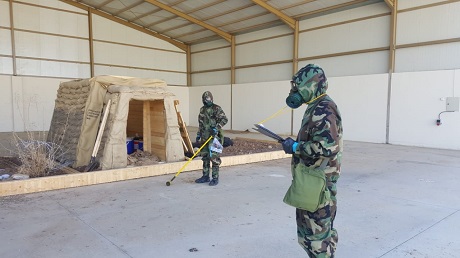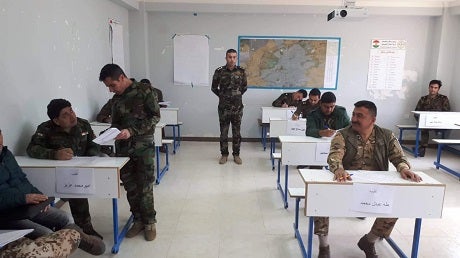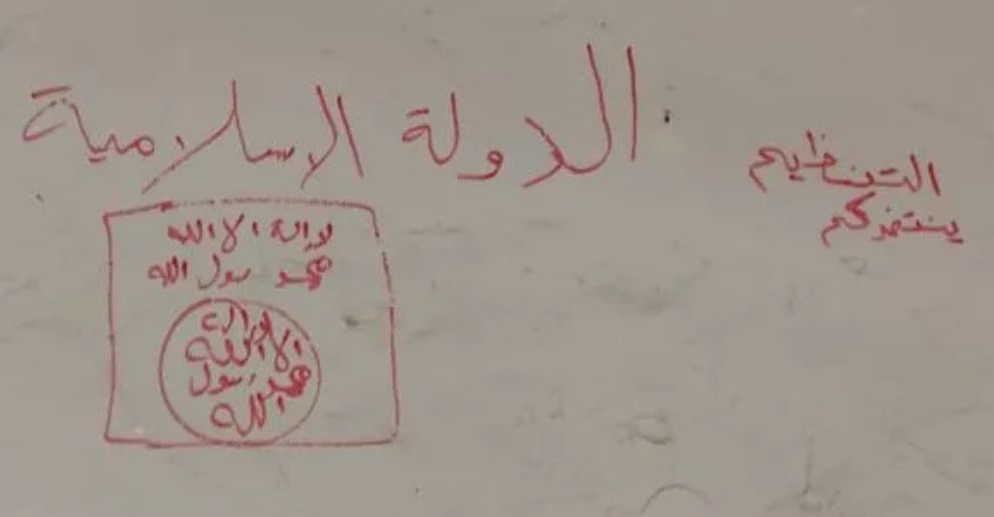Peshmerga learn to identify, clear chemical weapons used by ISIS

Islam Askandar Zebari, head of the Counter Chemical Regiment Command of the Peshmerga Ministry, said the aim of the training was to introduce the Peshmerga forces to the different chemical weapons and methods of delivery used by Islamic State (ISIS) militants during the war.
“The 22 officers were from various brigades of the Peshmerga Ministry,” Zebari said.
“Now all the departments, regiments, and brigades of the Peshmerga Ministry have specialized officers in chemical weapons.”
“The training aimed at teaching them how to protect themselves from chemical attacks and also determine what kinds of substances are used in them,” he added.
Peshmerga officers demonstrate what they learned during the four-week course at a ceremony in Erbil, March 13, 2019. Photo: Islam Askandar Zebari
ISIS militants attacked Kurdish Peshmerga on multiple fronts with mustard and chlorine gas, wounding dozens. Tests carried out by the Organization for the Prohibition of Chemical Weapons (OPCW) proved the group had used mustard gas against the Peshmerga.
The Peshmerga Ministry decided to establish the department in 2016 at the peak of the fight against ISIS, Zebari said.
The training session, which ended Wednesday, is the third of its kind since the department was founded.
Zebari said they will soon hold similar training for the Peshmerga’s party-affiliated 70 and 80 unit forces, Zeravani, and Defense and Emergency.
In the training, they used advanced tools such as the LCD3.3, a detector efficient enough “to detect toxic substances,” Zebari said.
Peshmerga officers learn to use state of the art chemical detecting technology. Photo: Islam Askandar Zebari
Amir Mohammed, a Peshmerga officer from Brigade 12 in the Peshmerga Ministry described the four-week training as “very, very important”.
“They taught us how to protect ourselves, our people, and Kurdistan from the threats of chemical weapons,” Mohammed told Rudaw English. “In the training we learnt about all the various types of chemicals.”
“Kurds have in the past suffered from chemical attacks such as Halabja and the ISIS war.”
Around 5,000 Kurds died and more than 10,000 were wounded when Saddam Hussein’s regime bombed the city of Halabja with chemical weapons in the spring of 1988.
Mohammed described how they were taught to use protective masks. Gas masks can protect the eyes and lungs, but normal military uniforms provide little to no protection, as mustard gas will penetrate clothing and be absorbed across any body surface.
The four-week course, which will soon be rolled out to other units and brigades, includes both classroom and practical sessions. Photo: Islam Askandar Zebari
Since ISIS attacked the Kurdistan Region in August 2014, igniting the war with Iraq’s Kurds, Peshmerga forces urged the international community to increase support. One country which has provided substantial military training is Germany.
Imran Muhsin, another Peshmerga officer who took part in the training, praised the German military personnel who supported their training.
“Germany played a pivotal role by supporting the counter-chemical department in the Peshmerga Ministry,” he said.
“The type of weapons ISIS used, we did not have any information about. Now, we distinguish them and know what substances are used … how to defuse them and end their danger,” he added.
The German military has trained Peshmerga at its own facilities in Germany and has pledged to supply all units and brigades with protectives masks and outfits.





